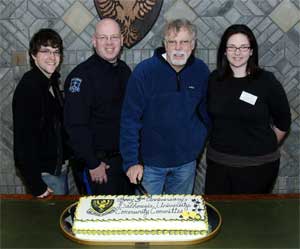 |
| DUCC members - Dave Jerome, president of the University of King├Ľs College Students├Ľ Union, Constable Brian Palmeter of the Halifax Regional Police, neighbour Brad McRae and Sarah Blades, an off campus student, help celebrate the DUCC├Ľs third birthday with a cake in Dalhousie├Ľs colours, black and gold. (Abriel photo) |
In contrast to American poet Robert Frost├Ľs famous line that ├ĺgood fences make good neighbours,ÔÇŁ tearing down barriers is reaping rewards for ║┌┴¤│ď╣¤═° and its neighbours.
Three years ago, the university and its neighbours were at loggerheads. The relationship was, to put it mildly, strained. Increasing enrolments brought rising noise levels and many conversions of single family dwellings to student rooming homes.
What was the solution? So, the ║┌┴¤│ď╣¤═° Community Committee (DUCC), an advisory committee to President Tom Traves, was set up. With the mandate to ├ĺenhance the relationship between the university and the community,ÔÇŁ the committee held its first meeting in March 2004.
No one knew what to expect. The membership was large ├Ĺ close to 30 people ├Ĺ and varied. It was led by two ║┌┴¤│ď╣¤═°vice-presidents ├Ĺ Eric McKee of Student Services and Dale Godsoe of External Relations.
There were representatives from the University of King├Ľs College, senior residence assistants, off-campus students, neighbours, the community liaison police, HRM councillors, the ║┌┴¤│ď╣¤═°and King├Ľs students├Ľ unions, the Spring Garden Road and Area Business Association, and other groups. It seemed big, cumbersome and just plain awkward. So it came as no surprise that a representative of an area ratepayers├Ľ association scoffed at the acronym DUCC, suggesting members call themselves ├ĺduckies.ÔÇŁ The name stuck.
In fact, as DUCC member Ava Czapaly of Beaufort Avenue points out, the DUCC answers the question about possible solutions by providing a forum for people to share information, air concerns, and work together to identify common solutions.
├ĺIt is a great partnership model and it works well because of its grassroots approach,ÔÇŁ says Ms. Czapalay.
Brad McRae, a South Street neighbour who recently retired from the DUCC after a three-year term, says he did not know what to expect when the DUCC began, but he is ├ĺproud of the hard work that was done by so many people from all aspects of life, and from around the university.ÔÇŁ
├ĺIt hasn├Ľt been easy,ÔÇŁ says HRM Councillor Sheila Fougere, who along with Councillor Sue Uteck, have been dedicated DUCC members. ├ĺPersistence has paid dividends in terms of the vastly improved relationship and communications between Dalhousie/King├Ľs and the community. It solidifies for me how important local solutions are for local issues,ÔÇŁ says Ms. Fougere.
Dr. McRae concurs. ├ĺBy having all the partners at the table, we were able to focus on the big picture and take some proactive steps to make things better.ÔÇŁ┬á
Some of those positive, big-picture things include supporting HRM councillors to change the land use bylaw. That effectively stopped the conversion of single family dwellings to mega-rooming houses. Members of the DUCC also backed the UPass, a metro transit pass for students, and, the most popular of initiatives, a designated police patrol for the surrounding neighbourhoods.
The dedicated police cruiser operates during the fall term on Thursday, Friday and Saturday nights, and during specific dates in the winter, from 10 p.m. to 5 a.m. ║┌┴¤│ď╣¤═°pays the salaries of the officers and HR Police contribute a designated cruiser.
Both neighbours and students sing the praises of the police and their designated car. In a recent random, house-to-house neighbourhood survey, neighbours say it has cut noise dramatically. The students who were polled say it makes them feel safe.
But all its successes aside, DUCC still faces many challenges. Committee chair Larry Maloney, associate vice-president, academic (who took over after the retirements of Mr. McKee and Ms. Godsoe), suggested a workshop be held to focus on the future.
The workshop identified the need for more community/student events as a top priority, as well as initiatives that will reduce litter and noise.
├ĺEveryone left the workshop feeling we had worked hard, worked collectively and
worked successfully,ÔÇŁ says Dr. Maloney. ├ĺI look forward to beginning the new process.ÔÇŁ
DUCC neighbourhood member John Czenze of Vernon Street, co-chair of the University Neighbourhood Watch Association, a local homeowners├Ľ group, is also looking forward to the future and ├ĺeven better ways to make Dal a great neighbour.ÔÇŁ
Mr. Czence says everyone needs to concentrate on keeping the neighbourhoods around Dal and King├Ľs ├ĺa vibrant, mixed area that all types of residents will be happy to call home.ÔÇŁ
And DUCC member Art Irwin, a landlord with properties on Chestnut Street, says while much work has been accomplished, DUCC will continue to discover new avenues to solve the problems that still exist. There will always be unresolved challenges, says Mr. Irwin, but as long as neighbours and students respect each other and the properties they live in, new ground will be gained.
And that has been the key to the DUCC├Ľs success. Grassroots input, respect, persistence and a goal to preserve the mixed, residential neighbourhoods around the universities.
Happy third birthday, DUCC. May the duckies celebrate many more.
Mary Somers, senior communications adviser in Communications and Marketing, is a proud ducky and serves as the DUCC├Ľs co-ordinator, communications specialist and Jill of all tasks.
